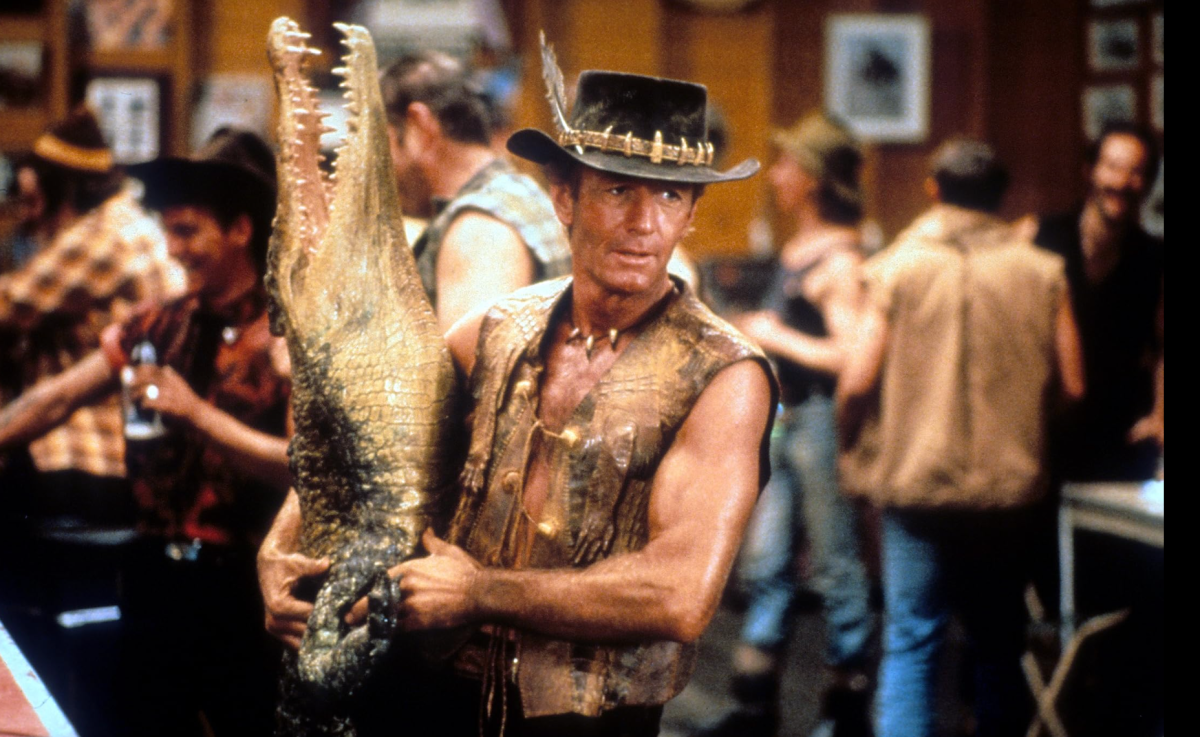
IMDB

“Crocodile Dundee” is a cult classic film that continues to captivate international audiences regarding life in the Australian Outback. Inspired by the true adventures of Rod Ansell, this 1986 comedy aimed to offer a glimpse of what life in this remote, often hostile wilderness entails. The film follows New York City reporter Sue Charlton’s (Linda Kozlowski) efforts to write a story on the Australian legend Michael “Crocodile” Dundee (Paul Hogan) — a character who serves as an almost exaggerated personification of the outback itself.
In his first appearance on-screen, Dundee sports a leather vest and cowboy hat, all while man-handling a crocodile. He could not be a more stereotypical depiction of an Australian personality; before he even appears on screen, rumors circulate that Dundee lost half of his leg to a crocodile before he ultimately killed the creature. His knowledge of nature goes beyond crocodiles, though, as Dundee is apparently extremely in touch with most Outback animals. Dundee exhibits his familiarity with the environment at the beginning of the film as he puts a large ox to sleep with just his mind. Despite his rugged depiction, Dundee is also undoubtedly quick-witted and clever, often silencing those who test him with puns (or punches). Likable and charismatic, Hogan’s portrayal of Dundee represents a highlight of the film.
Another high point of the film is the cinematography, which captures the breathtaking Australian landscape. Predating the reliance among filmmakers on greenscreen, the film highlights the sweeping scenery, vast open spaces and murky but intriguing waters of Northern Australia. The Outback is portrayed as dangerous and empty, alluring and full of opportunity.
After Charlton’s time in the wild, the movie shifts to Dundee’s arrival in New York City. The movie uses the “country boy in a big city” trope in a myriad of stereotypical yet tickling quips. However, this is still where the comedy of the film hits its stride, with the cultural differences between Australia and the United States on full display.
Dundee’s introduction to modern technology is comical and ridiculous, epitomized by his bewilderment at an escalator. His interactions with locals are also hysterical — Dundee’s assumption that New York is a “friendly city” plays out just as one might think. The cultural juxtaposition is clear and allows the film to poke fun at both societies: New Yorkers appear overly rigid and impersonal while Australians come off as more laid back and relaxed. This contrast, though exaggerated for comedic effect, highlights Australia’s reputation for informality and friendliness compared to the hustle and bustle of metropolitan life in the United States.
While a through-and-through comedy, “Crocodile Dundee” does have some surprisingly introspective moments; the acknowledgment of Australia’s aboriginal peoples and their fight to maintain sovereignty over their native land was particularly striking. Dundee interacts with aboriginal characters, notably his friend, who is a tracker. When Charlton asks whether Dundee believes they should regain their land, he replies, “Don’t own the land, they belong to it.” However, negative stereotypes — such as the depiction of the aboriginal peoples as having mystical powers and knowledge — persist throughout. As a result, while the film addresses issues facing these Indigenous populations in Australia, the surface-level approach to these complex issues ultimately falls short of providing a proper understanding of their cultures and histories.
“Crocodile Dundee” offers a humorous depiction of the Australian Outback for audiences in the United States. Despite its shortcomings regarding political simplifications and stereotyping, the movie is lighthearted and fun. Sure, it doesn’t break new ground or offer significant commentary on Australian sociopolitical issues, but it is not trying to achieve this goal. Instead, the film uses Dundee’s likability and charisma to offer an accessible taste of the Outback and a humorous glimpse of cultural contrasts between Australia and the United States. I would recommend “Crocodile Dundee” for those looking for a lighthearted watch, as it has become a beloved classic for international audiences.